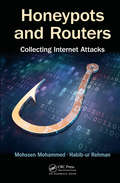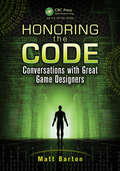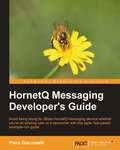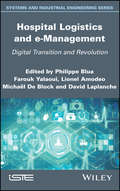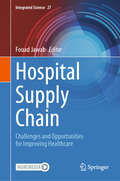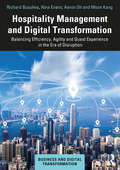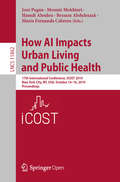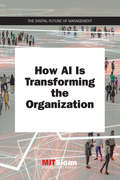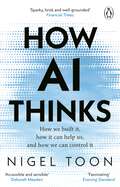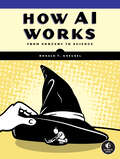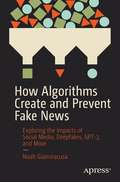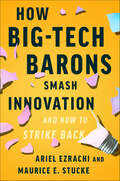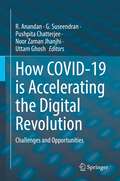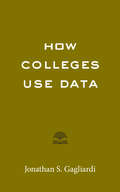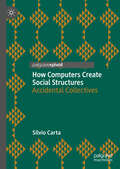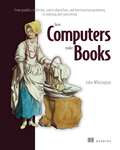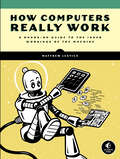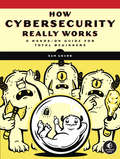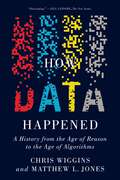- Table View
- List View
Honeypots and Routers: Collecting Internet Attacks
by Mohssen Mohammed Habib-ur RehmanAs the number of Internet-based consumer transactions continues to rise, the need to protect these transactions against hacking becomes more and more critical. An effective approach to securing information on the Internet is to analyze the signature of attacks in order to build a defensive strategy. This book explains how to accomplish this using h
Honoring the Code: Conversations with Great Game Designers
by Matt BartonIf you want to be successful in any area of game development-game design, programming, graphics, sound, or publishing-you should know how standouts in the industry approach their work and address problems. In Honoring the Code: Conversations with Great Game Designers, 16 groundbreaking game developers share their stories and offer advice for anyone
Hooked: A Thriller About Love and Other Addictions
by Matt RichtelNat Idle, a San Francisco writer with a medical degree, narrowly survives an explosion in an Internet cafe after a stranger hands him a note warning him to exit immediately. The handwriting on the note belongs to his deceased girlfriend, a Silicon Valley venture capitalist whom he has obsessively been mourning. So begins HOOKED, a pop thriller for the Internet Age, written with the force of an adrenaline rush and the pace of an intimate email dispatch you can't stop reading. Each chapter of this novel will keep readers hooked as Nat Idle searches for the love of his life in the midst of manipulation and conspiracy.
Hop, Skip, Go: How the Mobility Revolution Is Transforming Our Lives
by Stephen Baker John RossantUrban expert John Rossant and business journalist Stephen Baker look beyond the false promises of the past to examine the real future of transportation and the repercussions for the world’s cities, the global economy, the environment, and our individual lives.Human mobility, dominated for a century by cars and trucks, is facing a dramatic transformation. Over the next decade, new networked devices, from electric bikes to fleets of autonomous cars, will change the way we move. They will also disrupt major industries, from energy to cars, give birth to new mobility giants, and lead to a redesign of our cities. For Rossant and Baker, this represents the advance of the Information Revolution into the physical world. This will raise troubling questions about surveillance, privacy, the dangers from hackers and the loss of jobs. But it also promises startling efficiencies, which could turn our cities green and, perhaps, save our planet.In an engaging, deeply reported book, the authors travel to mobility hotspots, from Helsinki to Shanghai, to scout out this future. And they visit the companies putting it together. One, Divergent3d, is devising a system to manufacture cars with robots and 3D printers. PonyAI, a Chinese-Silicon Valley startup, builds autonomous software that perceives potholes, oncoming trucks, and wayward pedestrians, and guides the vehicle around them. Voom, an Airbus subsidiary, is racing with dozens of others to operate fleets of air taxis that fly by themselves.Hop, Skip, Go is about us: billions of people on the move. Underlying each stage of mobility, from foot to horse to cars and jets, are the mathematics of three fundamental variables: time, space and money. We measure each trip we take, whether to Kuala Lumpur or the corner drugstore. As the authors make clear, the coming mobility revolution will be no different. As they unveil the future, the authors explore how these changes might revamp our conception of global geography, the hours in our days, and where in the world we might be able to go.
HornetQ Messaging Developer’s Guide
by Piero GiacomelliWritten by an expert HornetQ developer this guide develops an applicable example to accompany practical tutorials and screenshots. Readers will have no trouble applying what they've learnt to their own messaging needs,This book is intended both for first time users and readers who are already using the JBoss messaging system. Advanced features are explained and every chapter suggests further improvement, so the willing reader is challenged by increasing their knowledge in a practical and productive way.
Hospital Logistics and e-Management: Digital Transition and Revolution
by Lionel Amodeo Farouk Yalaoui Philippe Blua Michaël De Block David LaplancheAs new information and communication technologies (NICTs) increasingly reorganize our practices and influence our daily lives, there is a pressing need to study their impact in the field of hospital logistics and to question their future use. Hospital Logistics and e-Management presents an inventory of the health information system, and deals with informational and logistical issues with regard to medical information. Through two case studies of hospital logistics systems which have drawn on academic research, this book examines how powerful decision support tools can improve the quality of patient service and logistics organization. The first case study deals with the influx of patients to emergency services and service organization, and the second with the optimization of product collection and distribution flows.
Hospital Supply Chain: Challenges and Opportunities for Improving Healthcare (Integrated Science #27)
by Fouad JawabThis book provides a comprehensive and essential resource for healthcare professionals, researchers and students interested in the field of hospital logistics. Hospital logistics is a complex process encompassing a wide range of design, planning, and execution activities, providing essential support for the production of healthcare services in all their forms. It is at once strategic, tactical and operational. Its scope ranges from the design and implementation of care units and healthcare facility networks, to the procurement of expensive drugs and medical equipment, the planning of human and material resources (beds, operating theaters, transport, etc.), and the management of stocks of drugs, blood and other health products. The role of hospital logistics is essential in guaranteeing the accessibility, quality and efficiency of care. It helps to optimize care production processes, reduce costs and improve workflow management. It offers an in-depth exploration of the key issues, best practices and technological advances in this critical field.
Hospitality Management and Digital Transformation: Balancing Efficiency, Agility and Guest Experience in the Era of Disruption (Business and Digital Transformation)
by Richard Busulwa Nina Evans Aaron Oh Moon KangHospitality managers are at a critical inflection point. Digital technology advancements are ramping up guest expectations and introducing nontraditional competitors that are beginning to disrupt the whole industry. The hospitality managers whose organizations are to thrive need to get their organizations into a position where they can effectively leverage digital technologies to simultaneously deliver breakthroughs in efficiency, agility, and guest experience. Hospitality Management and Digital Transformation is a much-needed guidebook to digital disruption and transformation for current and prospective hospitality and leisure managers. The book: • Explains digital technology advancements, how they cause disruption, and the implications of this disruption for hospitality and leisure organizations. • Explains the digital business and digital transformation imperative for hospitality and leisure organizations. • Discusses the different digital capabilities required to effectively compete as a digital business. • Discusses the new and/or enhanced roles hospitality and leisure managers need to play in effecting the different digital capabilities, as well as the competencies required to play these roles. • Discusses how hospitality and leisure managers can keep up with digital technology advancements. • Unpacks more than 36 key digital technology advancements, discussing what they are, how they work, and how they can be implemented across the hospitality and leisure industry. This book will be useful for advanced undergraduate and postgraduate students studying strategic management, IT, information systems, or digital business–related courses as part of degrees in hospitality and leisure management; as well as practitioners studying for professional qualifications.
Host Your Web Site In The Cloud: Amazon Web Services Made Easy
by Jeffrey BarrHost Your Web Site On The Cloud is your step-by-step guide to this revolutionary approach to hosting and managing your web applications.Cloud computing gives you the tools you need to prepare and cope with a traffic onslaught. You'll have the confidence to withstand a traffic surge without melting your servers or sending you into bankruptcy.There are a number of ways to use the cloud to host existing applications, build creative new ones, and improve the cost-effectiveness and efficiency or organizations large and small.You'll learn how to:gain a thorough understanding of cloud computingmaster the fundamentals of Amazon Web Servicesinstall and configure visual and command line toolsstore, retrieve, and distribute data quickly and easilybuild applications that scalemanage the monitoring, load balancing, and scaling capabilities of cloud computingAs a developer, you need room & flexibility to be innovative. Why waste time worrying about the technical aspects of server capacity? AWS handles security, load balancing, and server resources virtually so you're not restricted to one physical server.
Houdini On the Spot: Power User Tips and Techniques (On The Spot {{series}} Ser.)
by Craig ZerouniPacked with more than 350 techniques, this book delivers what you need to know-on the spot. Its concise presentation of professional techniques is suited to experienced artists whether you are:* Migrating from another visual effects application* Upgrading to Houdini 9* Seeking a handy reference to raise your proficiency with HoudiniHoudini On the Spot presents immediate solutions in an accessible format. It clearly illustrates the essential methods that pros use to get the job done efficiently and creatively. Screenshots and step-by-step instructions show you how to:* Navigate and manipulate the version 9 interface* Create procedural models that can be modified quickly and efficiently with Surface Operators (SOPs) * Use Particle Operators (POPs) to build complex simulations with speed and precision* Minimize the number of operators in your simulations with Dynamics Operators (DOPs) * Extend Houdini with customized tools to include data or scripts with Houdini Digital Assets (HDAs) * Master the version 9 rendering options including Physically Based Rendering (PBR), volume rendering and motion blur* Quickly modify timing, geometry, space and rotational values of your animations with Channel Operators (CHOPs)* Create and manipulate elements with Composite Operators (COPs); Houdini's full-blown compositor toolset* Make your own SOPs, COPs, POPs, CHOPs, and shaders with the Vector Expressions (VEX) shading language * Configure the Houdini interface with customized environments and hotkeys* Mine the treasures of the dozens of standalone applications that are bundled with Houdini
How AI Impacts Urban Living and Public Health: 17th International Conference, ICOST 2019, New York City, NY, USA, October 14-16, 2019, Proceedings (Lecture Notes in Computer Science #11862)
by Mounir Mokhtari Hamdi Aloulou Bessam Abdulrazak José Pagán María Fernanda CabreraThis open access book constitutes the refereed proceedings of the 17th International Conference on String Processing and Information Retrieval, ICOST 2019, held in New York City, NY, USA, in October 2019. The 15 full papers and 5 short papers presented in this volume were carefully reviewed and selected from 24 submissions. They cover topics such as: e-health technology design; well-being technology; biomedical and health informatics; and smart environment technology.
How AI Is Transforming the Organization (The Digital Future of Management)
by MIT Sloan Management ReviewA clear-eyed look at how AI can complement (rather than eliminate) human jobs, with real-world examples from companies that range from Netflix to Walmart.Descriptions of AI's possible effects on businesses and their employees cycle between utopian hype and alarmist doomsaying. This book from MIT Sloan Management Review avoids both these extremes, providing instead a clear-eyed look at how AI can complement (rather than eliminate) human jobs, with real-world examples from companies that range from Netflix to Walmart. The contributors show that organizations can create business value with AI by cooperating with it rather than relinquishing control to it. The smartest companies know that they don't need AI that mimics humans because they already have access to resources with human capability—actual humans.The book acknowledges the prominent role of such leading technology companies as Facebook, Apple, Amazon, Netflix, and Google in applying AI to their businesses, but it goes beyond the FAANG cohort to look at AI applications in many nontechnology companies, including DHL and Fidelity. The chapters address such topics as retraining workers (who may be more ready for change than their companies are); the importance of motivated and knowledgeable leaders; the danger that AI will entrench less-than-ideal legacy processes; ways that AI could promote gender equality and diversity; AI and the global loneliness epidemic; and the benefits of robot–human collaboration. ContributorsCynthia M. Beath, Megan Beck, Joe Biron, Erik Brynjolfsson, Jacques Bughin, Rumman Chowdhury, Paul R. Daugherty, Thomas H. Davenport, Chris DeBrusk, Berkeley J. Dietvorst, Janet Foutty, James R. Freeland, R. Edward Freeman, Julian Friedland, Lynda Gratton, Francis Hintermann, Vivek Katyal, David Kiron, Frieda Klotz, Jonathan Lang, Barry Libert, Paul Michelman, Daniel Rock, Sam Ransbotham, Jeanne W. Ross, Eva Sage-Gavin, Chad Syverson, Monideepa Tarafdar, Gregory Unruh, Madhu Vazirani, H. James Wilson
How AI Thinks: How we built it, how it can help us, and how we can control it
by Nigel ToonTHE #2 TIMES BESTSELLER'Artificial intelligence is going to have a massive impact on everyone’s lives... an accessible and sensible read that helps demystify AI' Deborah Meaden, entrepreneur and star of Dragon's Den'Nigel Toon is a visionary leader in the field of artificial intelligence... a must-read' Marc Tremblay, Distinguished Engineer, MicrosoftThose who understand how AI thinks are about to win big.We are used to thinking of computers as being a step up from calculators - very good at storing information, and maybe even at playing a logical game like chess. But up to now they haven't been able to think in ways that are intuitive, or respond to questions as a human might. All that has changed, dramatically, in the past few years.Our search engines are becoming answer engines. Artificial intelligence is already revolutionising sectors from education to healthcare to the creative arts. But how does an AI understand sentiment or context? How does it play and win games that have an almost infinite number of moves? And how can we work with AI to produce insights and innovations that are beyond human capacity, from writing code in an instant to unfolding the elaborate 3D puzzles of proteins?We stand at the brink of a historic change that will disrupt society and at the same time create enormous opportunities for those who understand how AI thinks. Nigel Toon shows how we train AI to train itself, so that it can paint images that have never existed before or converse in any language. In doing so he reveals the strange and fascinating ways that humans think, too, as we learn how to live in a world shared by machine intelligences of our own creation.
How AI Works: From Sorcery to Science
by Ronald T. KneuselAI isn&’t magic. How AI Works demystifies the explosion of artificial intelligence by explaining—without a single mathematical equation—what happened, when it happened, why it happened, how it happened, and what AI is actually doing "under the hood."Artificial intelligence is everywhere—from self-driving cars, to image generation from text, to the unexpected power of language systems like ChatGPT—yet few people seem to know how it all really works. How AI Works unravels the mysteries of artificial intelligence, without the complex math and unnecessary jargon.You&’ll learn: The relationship between artificial intelligence, machine learning, and deep learningThe history behind AI and why the artificial intelligence revolution is happening nowHow decades of work in symbolic AI failed and opened the door for the emergence of neural networksWhat neural networks are, how they are trained, and why all the wonder of modern AI boils down to a simple, repeated unit that knows how to multiply input numbers to produce an output number.The implications of large language models, like ChatGPT and Bard, on our society—nothing will be the same againAI isn&’t magic. If you&’ve ever wondered how it works, what it can do, or why there&’s so much hype, How AI Works will teach you everything you want to know.
How Algorithms Create and Prevent Fake News: Exploring the Impacts of Social Media, Deepfakes, GPT-3, and More
by Noah GiansiracusaFrom deepfakes to GPT-3, deep learning is now powering a new assault on our ability to tell what’s real and what’s not, bringing a whole new algorithmic side to fake news. On the other hand, remarkable methods are being developed to help automate fact-checking and the detection of fake news and doctored media. Success in the modern business world requires you to understand these algorithmic currents, and to recognize the strengths, limits, and impacts of deep learning---especially when it comes to discerning the truth and differentiating fact from fiction. This book tells the stories of this algorithmic battle for the truth and how it impacts individuals and society at large. In doing so, it weaves together the human stories and what’s at stake here, a simplified technical background on how these algorithms work, and an accessible survey of the research literature exploring these various topics. How Algorithms Create and Prevent Fake News is an accessible, broad account of the various ways that data-driven algorithms have been distorting reality and rendering the truth harder to grasp. From news aggregators to Google searches to YouTube recommendations to Facebook news feeds, the way we obtain information today is filtered through the lens of tech giant algorithms. The way data is collected, labelled, and stored has a big impact on the machine learning algorithms that are trained on it, and this is a main source of algorithmic bias – which gets amplified in harmful data feedback loops. Don’t be afraid: with this book you’ll see the remedies and technical solutions that are being applied to oppose these harmful trends. There is hope.What You Will LearnThe ways that data labeling and storage impact machine learning and how feedback loops can occurThe history and inner-workings of YouTube’s recommendation algorithmThe state-of-the-art capabilities of AI-powered text generation (GPT-3) and video synthesis/doctoring (deepfakes) and how these technologies have been used so farThe algorithmic tools available to help with automated fact-checking and truth-detectionWho This Book is ForPeople who don’t have a technical background (in data, computers, etc.) but who would like to learn how algorithms impact society; business leaders who want to know the powers and perils of relying on artificial intelligence. A secondary audience is people with a technical background who want to explore the larger social and societal impact of their work.
How Artifacts Afford: The Power and Politics of Everyday Things (Design Thinking, Design Theory)
by Jenny L. DavisA conceptual update of affordance theory that introduces the mechanisms and conditions framework, providing a vocabulary and critical perspective. Technological affordances mediate between the features of a technology and the outcomes of engagement with that technology. The concept of affordances, which migrated from psychology to design with Donald Norman's influential 1988 book, The Design of Everyday Things, offers a useful analytical tool in technology studies--but, Jenny Davis argues in How Artifacts Afford, it is in need of a conceptual update. Davis provides just such an update, introducing the mechanisms and conditions framework, which offers both a vocabulary and necessary critical perspective for affordance analyses.
How Australia Decides
by Sally YoungIn recent years, the Australian media have come under fire for their reporting of politics and election campaigns. Political reporting is said to be too influenced by commercial concerns, too obsessed with gossip and scandal, and too focused on trivia and 'sound bites' at the expense of serious issues. There are accusations of bias, sensationalism, 'lazy' journalism and 'horse-race' reporting that is obsessed with opinion polls. How Australia Decides is the first book to put these allegations to the test. Based on a four-year empirical study, Sally Young reports the results of the only systematic, historical and in-depth analysis of Australian election reporting. This groundbreaking book shows how election reporting has changed over time, and how political news audiences, news production and shifts in political campaigning are influencing media content, Ai with profound implications for Australian democracy.
How Big-Tech Barons Smash Innovation—and How to Strike Back
by Ariel Ezrachi Maurice E. StuckeTwo market experts deconstruct the drivers and inhibitors to innovation in the digital economy, explain how large tech companies can stifle disruption, assess the toll of their technologies on our well-being and democracy, and outline policy changes to take power away from big tech and return it to entrepreneurs.Silicon Valley’s genius combined with limited corporate regulation promised a new age of technological innovation in which entrepreneurs would create companies that would in turn fuel unprecedented job growth. Yet disruptive innovation has stagnated even as the five leading tech giants, which account for approximately 25 percent of the S&P 500’s market capitalization, are expanding to unimaginable scale and power. In How Big-Tech Barons Smash Innovation—and How to Strike Back, Ariel Ezrachi and Maurice E. Stucke explain why this is happening and what we can do to reverse it.While many distrust the Big-Tech Barons, the prevailing belief is that innovation is thriving online. It isn’t. Rather than disruptive innovations that create significant value, we are getting technologies that primarily extract value and reduce well-being. Using vivid examples and relying on their work in the field, the authors explain how the leading tech companies design their sprawling ecosystems to extract more profits (while crushing any entrepreneur that poses a threat). As a result, we get less innovation that benefits us and more innovations that surpass the dreams of yesteryears’ autocracies. The Tech Barons’ technologies, which seek to decode our emotions and thoughts to better manipulate our behavior, are undermining political stability and democracy while fueling tribalism and hate.But it’s not hopeless. The authors reveal that sustained innovation scales with cities not companies, and that we, as a society, should profoundly alter our investment strategy and priorities to certain entrepreneurs (“Tech Pirates”) and cities’ infrastructure.
How COVID-19 is Accelerating the Digital Revolution: Challenges and Opportunities
by G. Suseendran Uttam Ghosh Noor Zaman Jhanjhi R. Anandan Pushpita ChatterjeeThis book explores how digital technologies have proved to be a useful and necessary tool to help ensure that local and regional governments on the frontline of the emergency can continue to provide essential public services during the COVID-19 crisis. Indeed, as the demand for digital technologies grows, local and regional governments are increasingly committed to improving the lives of their citizens under the principles of privacy, freedom of expression and democracy.The Digital Revolution began between the late 1950s and 1970s and represents the evolution of technology from the mechanical and analog to the digital. The advent of digital technology has also changed how humans communicate – today using computers, smartphones and the internet. Further, the digital revolution has made a tremendous wealth of information accessible to virtually everyone. In turn, the book focuses on key challenges for local and regional governments concerning digital technologies during this crisis, e.g. the balance between privacy and security, the digital divide, and accessibility. Privacy is a challenge in the mitigation of COVID-19, as governments rely on digital technologies like contact-tracking apps and big data to help trace peoples’ patterns and movements. While these methods are controversial and may infringe on rights to privacy, they also appear to be effective measures for rapidly controlling and limiting the spread of the virus. Next, the book discusses the 10 technology trends that can help build a resilient society, as well as their effects on how we do business, how we work, how we produce goods, how we learn, how we seek medical services and how we entertain ourselves. Lastly, the book addresses a range of diversified technologies, e.g. Online Shopping and Robot Deliveries, Digital and Contactless Payments, Remote Work, Distance Learning, Telehealth, Online Entertainment, Supply Chain 4.0, 3D Printing, Robotics and Drones, 5G, and Information and Communications Technology (ICT).
How Colleges Use Data (Higher Ed Leadership Essentials)
by Jonathan S. GagliardiWhat does a culture of evidence really look like in higher education?The use of big data and the rapid acceleration of storage and analytics tools have led to a revolution of data use in higher education. Institutions have moved from relying largely on historical trends and descriptive data to the more widespread adoption of predictive and prescriptive analytics. Despite this rapid evolution of data technology and analytics tools, universities and colleges still face a number of obstacles in their data use. In How Colleges Use Data, Jonathan S. Gagliardi presents college and university leaders with an important resource to help cultivate, implement, and sustain a culture of evidence through the ethical and responsible use and adoption of data and analytics. Gagliardi provides a broad context for data use among colleges, including key concepts and use cases related to data and analytics. He also addresses the different dimensions of data use and highlights the promise and perils of the widespread adoption of data and analytics, in addition to important elements of implementing and scaling a culture of evidence.Demystifying data and analytics, the book helps faculty and administrators understand important topics, including:• How to define institutional aspirations using data• Equity and student success• Strategic finance and resource optimization• Academic quality and integrity• Data governance and utility• Implicit and explicit bias in data• Implementation and planning• How data will be used in the futureHow Colleges Use Data helps college and university leaders understand what a culture of evidence in higher education truly looks like.
How Computers Create Social Structures: Accidental Collectives
by Silvio CartaThis book introduces the idea of accidental collectives: the grouping of people that occurs as a by-product of the automated work of computers. Software has a growing influence in our lives automating and optimising mundane, time-consuming and repetitive tasks. In doing this, groups of people are automatically created as the result of classification and data analysis. Once grouped by the invisible agency of software, people interact and establish new relationships, generating new collectives and communities. With the support of case studies and real-life examples, this work explores the accidental nature of the generation of new social groups and questions the role of software in social interactions.
How Computers Make Books: From graphics rendering, search algorithms, and functional programming to indexing and typesetting
by John WhitingtonLearn about computer science by exploring the fascinating journey it took to make this book!How Computers Make Books introduces what&’s wonderful about computer science by showing how computers have transformed the art of publishing books. Author and publishing software developer John Whitington reveals the elegant computer science solutions invented to solve big publishing challenges. In How Computers Make Books you&’ll discover: How human descriptions are translated into computer programs How a computer can understand document formatting How a program decides where to print ink on a page Why computer science is so interesting to computer scientists, and why it might interest you …and much more! How do computers represent all the different languages and letters used by humans? How do we compress a book&’s worth of complex information so it can be transferred in seconds? And what exactly is a computer program? This book answers all those questions by telling the story of how it was created! About the technology Computers are part of every step in creating a book, from capturing the author&’s words as a digital document to controlling how the ink gets onto the paper. How Computers Make Books introduces basic computer science concepts like file formatting, transfer, and storage, computer programming, and task automation by guiding you through the modern digital printing process. About the book This book takes you on a journey from the plain white page, weaving through typesetting, making gray images from black ink, electronic file formats, and more. It makes computer science come alive as you see how every word, illustration, and page has its own story. You&’ll even learn to write your own simple programs and discover hands-on what&’s so intoxicating about computer science. What's inside How human descriptions are translated into computer programs How a digital computer thinks about print documents How a program decides where to print ink on a page How the history of typesetting shows up in modern books About the reader For the curious-but-clueless about computer science—and anyone interested in how computers make books! About the author John Whitington is the founder of a company that builds software for electronic document processing. He has studied and taught Computer Science at Queens&’ College, Cambridge. Technical editor on this book was Bojan Stojanovic. Table of Contents 1 Putting marks on paper 2 Letter forms 3 Storing words 4 Looking and finding 5 Typing it in 6 Saving space 7 The sums behind the screen 8 Gray areas 9 A typeface 10 Words to paragraphs 11 Out into the world
How Computers Really Work: A Hands-On Guide to the Inner Workings of the Machine
by Matthew JusticeAn approachable, hands-on guide to understanding how computers work, from low-level circuits to high-level code.How Computers Really Work is a hands-on guide to the computing ecosystem: everything from circuits to memory and clock signals, machine code, programming languages, operating systems, and the internet.But you won't just read about these concepts, you'll test your knowledge with exercises, and practice what you learn with 41 optional hands-on projects. Build digital circuits, craft a guessing game, convert decimal numbers to binary, examine virtual memory usage, run your own web server, and more.Explore concepts like how to:Think like a software engineer as you use data to describe a real world conceptUse Ohm's and Kirchhoff's laws to analyze an electrical circuitThink like a computer as you practice binary addition and execute a program in your mind, step-by-stepThe book's projects will have you translate your learning into action, as you:Learn how to use a multimeter to measure resistance, current, and voltageBuild a half adder to see how logical operations in hardware can be combined to perform useful functionsWrite a program in assembly language, then examine the resulting machine codeLearn to use a debugger, disassemble code, and hack a program to change its behavior without changing the source codeUse a port scanner to see which internet ports your computer has openRun your own server and get a solid crash course on how the web worksAnd since a picture is worth a thousand bytes, chapters are filled with detailed diagrams and illustrations to help clarify technical complexities.Requirements: The projects require a variety of hardware - electronics projects need a breadboard, power supply, and various circuit components; software projects are performed on a Raspberry Pi. Appendix B contains a complete list. Even if you skip the projects, the book's major concepts are clearly presented in the main text.
How Cybersecurity Really Works: A Hands-On Guide for Total Beginners
by Sam GrubbCybersecurity for Beginners is an engaging introduction to the field of cybersecurity. You'll learn how attackers operate, as well as how to defend yourself and organizations against online attacks.You don&’t need a technical background to understand core cybersecurity concepts and their practical applications – all you need is this book. It covers all the important stuff and leaves out the jargon, giving you a broad view of how specific attacks work and common methods used by online adversaries, as well as the controls and strategies you can use to defend against them. Each chapter tackles a new topic from the ground up, such as malware or social engineering, with easy-to-grasp explanations of the technology at play and relatable, real-world examples. Hands-on exercises then turn the conceptual knowledge you&’ve gained into cyber-savvy skills that will make you safer at work and at home. You&’ll explore various types of authentication (and how they can be broken), ways to prevent infections from different types of malware, like worms and viruses, and methods for protecting your cloud accounts from adversaries who target web apps. You&’ll also learn how to: • Use command-line tools to see information about your computer and network • Analyze email headers to detect phishing attempts • Open potentially malicious documents in a sandbox to safely see what they do • Set up your operating system accounts, firewalls, and router to protect your network • Perform a SQL injection attack by targeting an intentionally vulnerable website • Encrypt and hash your files In addition, you&’ll get an inside look at the roles and responsibilities of security professionals, see how an attack works from a cybercriminal&’s viewpoint, and get first-hand experience implementing sophisticated cybersecurity measures on your own devices.
How Data Happened: A History from the Age of Reason to the Age of Algorithms
by Matthew L. Jones Chris Wiggins“Fascinating.” —Jill Lepore, The New Yorker A sweeping history of data and its technical, political, and ethical impact on our world. From facial recognition—capable of checking people into flights or identifying undocumented residents—to automated decision systems that inform who gets loans and who receives bail, each of us moves through a world determined by data-empowered algorithms. But these technologies didn’t just appear: they are part of a history that goes back centuries, from the census enshrined in the US Constitution to the birth of eugenics in Victorian Britain to the development of Google search. Expanding on the popular course they created at Columbia University, Chris Wiggins and Matthew L. Jones illuminate the ways in which data has long been used as a tool and a weapon in arguing for what is true, as well as a means of rearranging or defending power. They explore how data was created and curated, as well as how new mathematical and computational techniques developed to contend with that data serve to shape people, ideas, society, military operations, and economies. Although technology and mathematics are at its heart, the story of data ultimately concerns an unstable game among states, corporations, and people. How were new technical and scientific capabilities developed; who supported, advanced, or funded these capabilities or transitions; and how did they change who could do what, from what, and to whom? Wiggins and Jones focus on these questions as they trace data’s historical arc, and look to the future. By understanding the trajectory of data—where it has been and where it might yet go—Wiggins and Jones argue that we can understand how to bend it to ends that we collectively choose, with intentionality and purpose.
